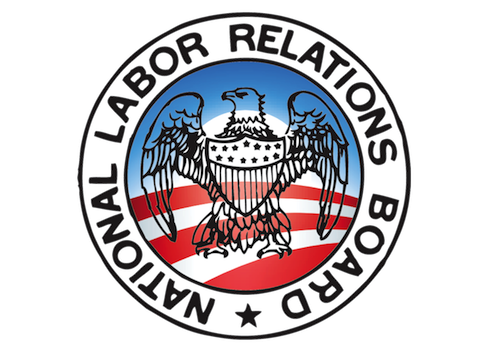The Senate filibuster deal that scrapped the nominations of two unconstitutional labor appointees will not alleviate the pro-union imbalance on the board, according to union watchdogs.
Just hours after Democrats announced that President Barack Obama withdrew the nominations of the National Labor Relations Board members Sharon Block and Richard Griffin, the politically powerful AFL-CIO handpicked two replacement nominees, according to Politico.
Conservative labor activists and attorneys said the replacement nominees, former AFL-CIO attorney Nancy Schiffer and Democratic NLRB attorney Kent Hirozawa, could maintain the anti-business climate that has defined the NLRB under the Obama administration.
The new picks immediately drew the ire of the National Right to Work Foundation, which has successfully challenged the NLRB’s authority after President Obama illegally used his recess authority to appoint Block and Griffin to the board.
"Even though the American people, who are outraged by this [rogue] NLRB, were not included in these discussions, Obama’s NLRB appointments will pave the way for at least three more years of the very forced-unionism giveaways union bosses failed to obtain through the legislative process," NRTW spokesman Anthony Riedel said in a statement. "Both NLRB nominees, who are practically guaranteed to be confirmed, are staunch pro-forced unionism advocates."
Former NLRB general counsel Jerry Hunter said he is not confident that Obama pursued a moderate course in replacing Block and Griffin in the five-nominee package that will undergo Senate confirmation.
"Block and Griffin were part of a pro-union triumvirate that threw to the wind any objective decision-making," said Hunter, who is helping to challenge the authority of the board in federal court. "If the administration permitted the AFL-CIO to pick the two new proposed nominees, then this would simply be a continuation of the administration’s policy of permitting organized labor to pick Democratic nominees for appointment to labor agencies."
Republicans negotiated the withdrawal of Block and Griffin on Tuesday in order to prevent the Democrats from using the nuclear option to lower the confirmation threshold to a bare majority. The GOP allowed the White House to choose two labor attorneys as part of the agreement, though sources emphasized that Republicans promised a fair hearing, rather than confirmation.
"The basics [of the agreement] are that two new NLRB nominees are submitted and the Senate gives them a fair hearing—which is what [Minority Leader Mitch] McConnell [(R., Ky.)] and Senate Republicans called for as early as January of this year," a top Senate aide told the Washington Free Beacon on condition of anonymity.
AFL-CIO president Richard Trumka led the charge to pressure Senate Majority Leader Harry Reid (D., Nev.) to "pull the trigger" on the nuclear option last week. The union is a major powerbroker in the Democratic Party, spending more than $30 million on the 2012 election.
AFL-CIO did not return multiple requests for comment.
Riedel had harsh words for the Republican lawmakers who struck the deal, which will continue to undermine workers and employers.
"After Sen. John McCain [(R., Ariz.)] apparently struck a backroom deal today with Senate Democrats to sell out independent-minded workers, the Obama White House wasted no time meeting with union bosses to determine who they want on the agency to enact their radical agenda," he said.
Senate Democrats have pledged to rush the two new nominees through confirmation by August, when the NLRB chairman Mark Gaston Pearce’s term is set to expire. If the Senate fails to confirm at least three nominees, the board will not be able to issue rulings in labor disputes.
Obama nominated two Republicans and Pearce to serve in the board’s next term, which could mean a GOP majority if Schiffer and Hirozawa are not confirmed.
The Democratic majority moving forward will have vast implications for labor law in the United States. The Supreme Court will review NLRB v. Noel Canning a January appeals court ruling that declared Block and Griffin’s appointments unconstitutional and could invalidate every board decision issued since January 2012. It would be up to the new board to re-issue decisions on all of those cases.
"Even if Noel Canning comes down, you could have some Obama appointees that aren’t any better, from an employer viewpoint, than the last. They could rubberstamp all the [Block and Griffin panel] rulings," said David Phippen, a labor attorney with Constangy, Brooks, & Smith.
Activists who campaigned against the nuclear option, as well as Block and Griffin, said they hope the new nominations will not mimic the behavior of the current board.
"We hope to see people that have the ability to be neutral arbiters of labor law—Obama’s struggled to put forward nominees who meet that criteria," said Geoffrey Burr, chairman of the Center for a Democratic Workplace (CDW).
CDW, which is working to preserve the secret ballot in union election, spent thousands of dollars on ads in swing states to pressure senators to preserve the 60-vote threshold on executive appointments in the lead up to the Tuesday’s deal. Burr emphasized that the CDW has yet to decide whether or not it will support Schiffer or Hirozawa.
Senate Republicans claimed victory for the deal, saying that it restored the power balance to the Capitol.
"This agreement allows the Senate to make clear that this president, or any president, cannot thumb his nose at the Senate’s constitutional role in our system of checks and balances," said Sen. Lamar Alexander (R., Tenn.), ranking Republican on the Senate Labor Committee.
The nominees will appear before the labor committee next Tuesday morning.
